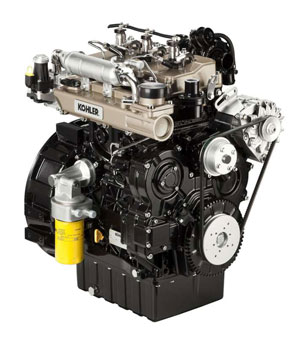The Secret to Long Engine Life: Advice from the Experts on Maintaining KOHLER Engine

Industry Expert Mr. Narender Singh Kamboj discusses the best practices for extending the life of, and achieving optimal performance of your engine.
Have a question about KOHLERengines? We've compiled a list of common questions and answers below for Maintenance of KOHLER engine:
1. What can I do to maximize the life of my engine?
To keep your engine operating at peak performance, be sure to perform proper maintenance for each of the following areas, as outlined in your owner's manual:
- 1. Air filter
- 2. Oil (and filter)
- 3. Cooling system (including the flywheel fan, cooling fins, and any radiators or oil coolers)
2. What fuel is recommended for my engine?
Gasoline
Use unleaded regular gasoline with a pump sticker octane rating of 87 or higher. If you are required to use oxygenated fuel, blends containing a maximum of 10% ethanol or 15% MTBE are acceptable. Fuels with higher concentrations and methanol blends are not recommended.
Diesel
Use the same type of diesel fuel as used in cars (EN 590 for E.U. - ASTM D975 regulation - S 15 for U.S). Use of other types of fuel could damage the engine. Do not use dirty diesel fuel or mixtures of fuel and water since this will cause serious engine faults. When operating the engine in ambient temperatures lower than 0 degrees Celsius, use suitable low temperature fuel normally available from fuel distributors.
3. What blends of gasoline may I use in my Kohler Engine?
Gasohol (up to 10% ethyl alcohol, 90% unleaded gasoline by volume) is approved as a fuel for KOHLER engines. Other gasoline/alcohol blends including E20 and E85 are not to be used and are not approved. Any failures resulting from use of these fuels will not be warranted.
4. What oil should I use?
Recommendations vary for each engine type based on engine and operating temperature. Please consult your owner’s manual for oil recommendations.
5. Can I use synthetic oil?
Synthetic oils meeting the classifications listed in your owner's manual may be used; however, you should still perform oil changes at the recommended intervals. To allow the piston rings to seat properly, we recommend operating a new or rebuilt engine for at least 50 hours on standard oil before switching to synthetic oil.
6. How much oil goes in my engine?
Due to possible variations within a model series, we recommend that you rely on your actual dipstick readings. Add oil of the proper type up to the "F" or "FULL" mark on the dipstick. Your owner's manual can provide you with more specific information.
7. Can I use additives in my engine?
We do not recommend using additives or cleaners in the oil or fuel system. Air-cooled engines operate at higher temperatures than liquid-cooled automotive engines, and additives developed for automotive use may not perform properly at higher temperatures.
In addition, oil additives can prematurely break down, altering the properties of the oil and leading to extensive internal damage or failure. Fuel system cleaning additives have a tendency to separate and turn acidic, causing damage to fuel system components. We do, however, recommend a fuel stabilizer during periods of non-use (one month or more) to retard fuel deterioration.
Professional Help
The following are all the maintenance tips for Kohler Engine. If you need t an expert to inspect the Kohler Engine and set it right. Then Power Maker is Kohler Engine Service provider as Sales and Service key station and offers our customers comprehensive and fully customized solutions for the technical support and management of their engines and other components of the machine.
For more details visit - www.powermaker.in